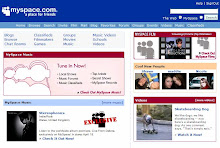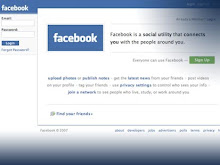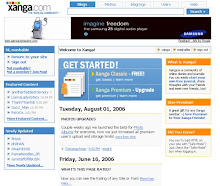In researching my topic I found some interesting statistics that show how many teens use social networking sites along with how many are unaware of the lack of privacy these websites contain.
First off, Myspace has grown 318% in the last year to 37.3 million visitors making it the top social networking site on the web. In addition to this 70% of teens have online profiles on social networking sites like Myspace or facebook according to the National Center for Missing & Exploited Children in Alexandria.
Not only do more than half of teens around the world have their own profiles on these sites, but the majority of them post personal information disregarding the possible dangers associated with it. For example, 73% of high school students reveal their real first names onilne, 30% identify their schools, and 53% post their own photos according to a study done by i-Safe Inc.
Overall a study done in 2007 by Pew Internet & American Life Study showed that 60% of internet users do not worry about their personal information that is available on the web.
Thursday, March 27, 2008
Monday, March 24, 2008
What the Experts Say
In searching through several articles I came up with a number of experts' opinions and advice on online safety and the dangers of posting risky information or photos on the internet.
"When teens sit down at their computer terminals, they think they're alone." -Jeff Godlis, director of communications for i-Safe Inc.
"Kids used to pass notes around school... Now they're putting it onto pages with 42 million users."-Parry Aftab, director of WiredSafety.org.
"Kids feel anonymous when they're online... When the reality is just the opposite." -Harris, principal of a school in San Francisco.
"You shouldn't post private information about yourself, and you don't have the right to post someone else's secrets." -Nancy Willard, director of the Center for Safe and Responsible Internet Use.
"Kids are going to argue that these blogs are part of their private lives. And that's the point: They aren't private at all." -Nancy Willard
"The internet feels so incredibly safe, secure, and anonymous. People care about other things more when (privacy) is on the table."- Fred Cate, a law professor at Indiana University and a privacy expert.
"The vast majority of people want to protect their privacy. But they aren't doing anything about it." -Larry Ponemen, chairman of the Ponemen Institute, a Traverse City, Michigan researcher focused on privacy and data protection.
"When teens sit down at their computer terminals, they think they're alone." -Jeff Godlis, director of communications for i-Safe Inc.
"Kids used to pass notes around school... Now they're putting it onto pages with 42 million users."-Parry Aftab, director of WiredSafety.org.
"Kids feel anonymous when they're online... When the reality is just the opposite." -Harris, principal of a school in San Francisco.
"You shouldn't post private information about yourself, and you don't have the right to post someone else's secrets." -Nancy Willard, director of the Center for Safe and Responsible Internet Use.
"Kids are going to argue that these blogs are part of their private lives. And that's the point: They aren't private at all." -Nancy Willard
"The internet feels so incredibly safe, secure, and anonymous. People care about other things more when (privacy) is on the table."- Fred Cate, a law professor at Indiana University and a privacy expert.
"The vast majority of people want to protect their privacy. But they aren't doing anything about it." -Larry Ponemen, chairman of the Ponemen Institute, a Traverse City, Michigan researcher focused on privacy and data protection.
Thursday, March 20, 2008
Argument 2: Businesses Using the Internet as a Recruiting Tool
What many people are unaware of is that a lot of businesses have begun to use the internet and social networking sites as tools when it comes to hiring new associates. It's so easy for employers to search a potential hire and find out practically everything about them just by looking at their Myspace page. There have been countless number of instances where a person applies for a job and doesn't land the position because of something they said or a picture they posted on their web page that was inappropriate. As I talked about in my first argument, the internet is not a private place therefore practically anyone can see what you post, including your boss. A solution to keep your potential employer, or anyone else for that matter, from learning things about you and your personal life that you don't want them to know is to not post personal or inappropriate information. It's that simple. People feel so secure about saying or doing things online that they wouldn't normally say or do in person, but clearly this is going to have a negative affect on them in the future. What good can possibly come from sharing everything about yourself on a completely public social networking site? Well I suppose we have to account for both sides of the argument so I'll admit there have been instances where businesses have actually used social networking sites in favor of potential hires. Upon finding people's internet profiles, some employers have hired new associates based on good information they found. This, however, is very rarely the case as the majority of teens and young adults post provocative and rude pictures or comments on their blogs, leaving them without the slightest job opportunity.
Tuesday, March 18, 2008
Argument 1: Privacy
The first main point that I would like to discuss is the fact that the internet is not a private place. I realize that I have pointed this out quite a few times before, but that is because it's one of the more major issues when it comes to this topic. As I stated before, many people do not realize the little privacy they have when it comes to blog sites like Myspace, Facebook, and Xanga. Teens often post things thinking that only their friends or people they know will see it, but the fact that anyone around the world can access these websites never cross their mind. Also, the fact that school administrators or job employers have access to these sites comes as quite a surprise for many teens when they suddenly get suspended or lose a job for something they thought was only a part of their private lives. Not only is what you put on the internet public to anyone, it's permanent as well. Once you post those pictures from Friday night's party, they are vulnerable to being posted anywhere over the internet. You may think you deleted that comment you wrote when you were angry, but don't be too naive to believe it may come back to haunt you.
Sunday, March 16, 2008
Pros and Cons
While keeping an online blog like Myspace or Facebook may seem like a convenient and entertaining way to socialize with friends or meet new people, it can also be risky depending on how much you choose to let other people see. The most important thing to realize when participating in social networking is that your profile, as safe as it seems, is not necessarily private. It's easy to post something others might see as provocative or inappropriate whereas at the time it didn't seem so to you, but then years later when you're applying for your dream job and the company finds those posts that you thought you got rid of, your life may not turn out as you had planned.
Many people think they are simply taking part in something safe that is so common these days and in believing this they share private information about themselves or are too open about what they say and do. It's understandable that the internet makes people feel more comfortable and lets them be who they wouldn't normally be in real life, but this is what people don't realize may affect their futures.
Many people think they are simply taking part in something safe that is so common these days and in believing this they share private information about themselves or are too open about what they say and do. It's understandable that the internet makes people feel more comfortable and lets them be who they wouldn't normally be in real life, but this is what people don't realize may affect their futures.
Friday, March 14, 2008
Topic Overview
The internet has come a long way over the years. In today's society kids are so familiar with technology they use it for everything, including their social lives. Some may say websites such as Facebook and Myspace are an innocent attempt for children and teens to chronicle their lives and socialize with friends, but little do many of us realize that the internet can be a scary place. Besides the fact that the internet is an easy way for online predators to find their next victims, a new concern has come about in recent years.
People tend to believe that websites are private spaces for being open and sharing every aspect of their lives with friends, but what many are too naiive to understand is that the internet is actually a completely public place. So, when a friend decides to put up pictures of that party on Friday night and there's one displaying your underage drinking, think about how that might affect you in the future should certain people or authorities see it. For many companies, the internet has become a source in performing background checks on their employees, and evidentally has lead to people losing jobs because of what they posted online. Basically, the point here is that the internet is for the most part is not a private place so be careful of what you share because it could come back to haunt you..
People tend to believe that websites are private spaces for being open and sharing every aspect of their lives with friends, but what many are too naiive to understand is that the internet is actually a completely public place. So, when a friend decides to put up pictures of that party on Friday night and there's one displaying your underage drinking, think about how that might affect you in the future should certain people or authorities see it. For many companies, the internet has become a source in performing background checks on their employees, and evidentally has lead to people losing jobs because of what they posted online. Basically, the point here is that the internet is for the most part is not a private place so be careful of what you share because it could come back to haunt you..
Subscribe to:
Posts (Atom)


